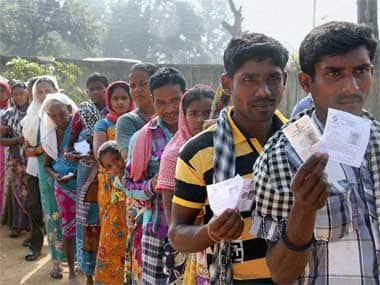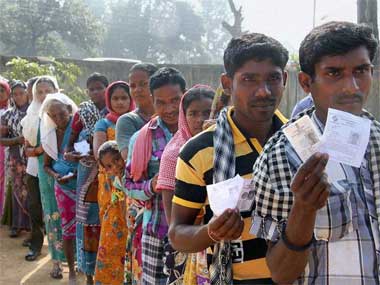In what could be indicative of how widespread the desire for change is among the Indian electorate,
a survey by Pew Research’s Global Attitudes Project
has found that more than two thirds of Indians, almost 70 per cent, are dissatisfied with the state of affairs in India right now. This 70 percent is shared, however, by those who would like to see a Narendra Modi-led NDA government at the Centre and those who prefer the left-of-centre Congress-led UPA government. The survey was conducted in between December 2013 and January 2014 in states and cities that are home to about 91 percent of the Indian population. Pew research said the margin of error for the report is plus or minus 3.8 percentage points. 63 percent of Indians reportedly prefer the BJP to lead the next government. [caption id=“attachment_1238425” align=“alignleft” width=“380”]
 Representational image. PTI[/caption] The 63 percent statistic comes from a previous report by Pew research, in February, predicting a crushing defeat for the BJP, a much more emphatic prediction than most other opinion polls and pre-election surveys by Indian psephologists and survey organisations. The biggest problem with the survey,
as reported by Firstpost earlier
, is the absent Third Front option or any other alternative. Given that the Lok Sabha elections this summer are anything but a two-horse race, the survey result appears slightly oversimplified. The other major gap in extrapolating data from the survey is the absent details on methodology and limitations. “In a poll like this, what matters is not the number of samples. The sample can be a 1000 or a million and can still go wrong if the science is wrong. The sample size can be less than 1000 and still go right because the science is correct. We wouldn’t know the Pew methodology until they spell out the details and more importantly, clearly state the limitations,” Firstpost has argued. The latest survey also attempted to guage Indians’ attitudes towards the global superpowers USA and China. Despite a recent chill in relations with the USA, 56 percent of respondents experssed a favourable view of the country; only 35 percent expressed a favourable view of China. However, one third of respondents held the belief that China is a growing superpower that would eventually replace the US as the world’s top economic superpower. “Such sentiment in favor of the United States exists despite the fact that the Pew Research Center survey was in the field in India during and in the immediate aftermath of the controversial December 12, 2013, arrest and strip-search of India’s female deputy consul general in New York on charges of visa fraud,” said the survey
report
. Meanwhile, only 19 percent of the respondents expressed a favourable view of Pakistan. Asked to name which among China, Pakistan, the LeT and Naxals posed the greatest threat to India, 47 percent chose Pakistan.
Representational image. PTI[/caption] The 63 percent statistic comes from a previous report by Pew research, in February, predicting a crushing defeat for the BJP, a much more emphatic prediction than most other opinion polls and pre-election surveys by Indian psephologists and survey organisations. The biggest problem with the survey,
as reported by Firstpost earlier
, is the absent Third Front option or any other alternative. Given that the Lok Sabha elections this summer are anything but a two-horse race, the survey result appears slightly oversimplified. The other major gap in extrapolating data from the survey is the absent details on methodology and limitations. “In a poll like this, what matters is not the number of samples. The sample can be a 1000 or a million and can still go wrong if the science is wrong. The sample size can be less than 1000 and still go right because the science is correct. We wouldn’t know the Pew methodology until they spell out the details and more importantly, clearly state the limitations,” Firstpost has argued. The latest survey also attempted to guage Indians’ attitudes towards the global superpowers USA and China. Despite a recent chill in relations with the USA, 56 percent of respondents experssed a favourable view of the country; only 35 percent expressed a favourable view of China. However, one third of respondents held the belief that China is a growing superpower that would eventually replace the US as the world’s top economic superpower. “Such sentiment in favor of the United States exists despite the fact that the Pew Research Center survey was in the field in India during and in the immediate aftermath of the controversial December 12, 2013, arrest and strip-search of India’s female deputy consul general in New York on charges of visa fraud,” said the survey
report
. Meanwhile, only 19 percent of the respondents expressed a favourable view of Pakistan. Asked to name which among China, Pakistan, the LeT and Naxals posed the greatest threat to India, 47 percent chose Pakistan.
70 pc Indians unhappy, says Pew report, but will 63 pc really vote BJP?
FP Staff
• April 2, 2014, 11:20:01 IST
The survey also found Indians to continue to be favourably disposed to the US, less so to China.
Advertisement
)
End of Article